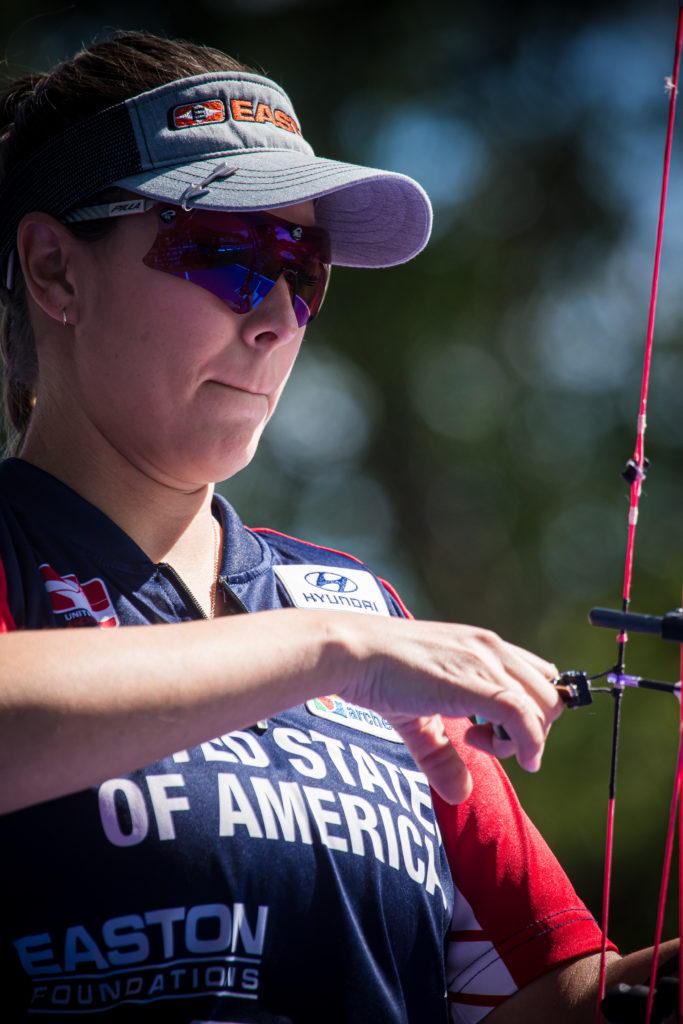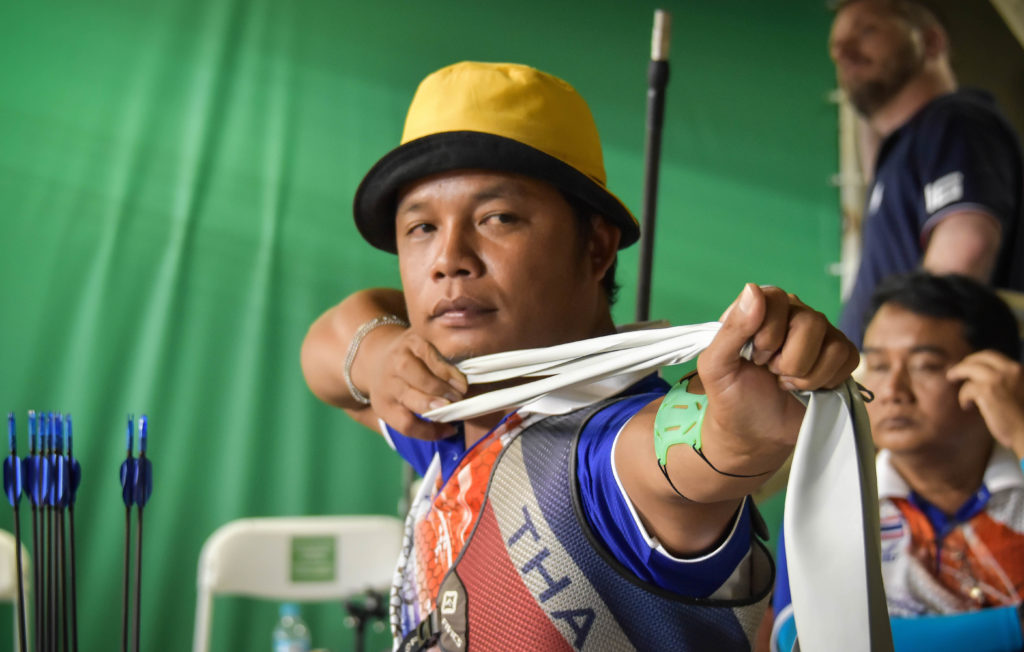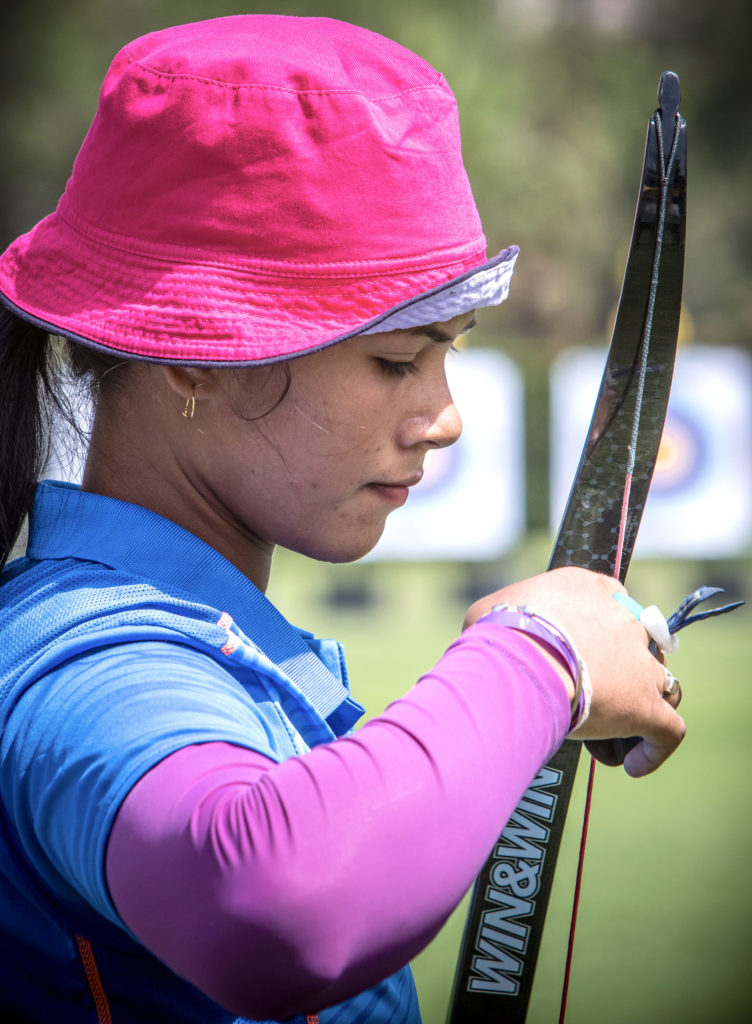Retired Olympic medallist Lisa Unruh knows a thing or two about archery tournaments. She shared her secrets with Bow
If you are going to a national championship and have a long journey, when do you arrive? do you always stay overnight at the venue of the competition?
In most cases the shooting and competition will start in the morning, so I will arrive the day before. I always try to arrive with enough time to have dinner in peace, and to not be rushed. Basically, I like to time my arrival in such a way that there is minimal stress. Because the competition will usually have enough of that.
Do you do any training immediately before the competition?
If I can, I usually do a small training session of about 50-70 arrows on the day before. This training is just a matter of shooting loosely, and to strengthen the feeling that everything is on the right track. Training like this should add a degree of calmness and self-confidence, which I can take into the competition with me.
It would be different, however, if the training load during the week was already very high. I would then usually not train the day before the competition. This should be the same for recreational archers who train two or three times a week. The day before, they should shoot about 50 arrows to work on their shooting technique. You could do this in the morning before you go to the meet. But if you’ve already shot five days that week, take a break.
It is important that training before an important competition has no performance aspect, and is not about working on technique. The only thing that should happen on the day before is relaxed shooting, getting into the flow of the movement and increasing your confidence.
What are your normal preparations that you do the day before a competition?
I check that I have all my food and drinks ready for the competition. If I need to go shopping, I do that, otherwise I pay attention to my normal routines. I don’t suddenly start to do anything special the day before a competition.
My routines include, for example, stretching exercises in the evening followed by neurological exercises. I normally start my morning with the yoga exercise “sun salutation”, followed by breathing exercises. These are all exercises that are part of my normal daily routine.
It would make no sense if someone never meditates, to start meditating the day before a competition. The body and mind would not be able to cope with these exercises. They only work as part of a regular routine. Even if the competition is a special one, I behave as if I was doing an ordinary day.
For me, I also sleep at least eight hours a night. Other athletes might need less sleep than me, but I always make sure that I get at least eight hours the night before a competition.
What food and drink do you take to competitions?
I make sure that the food I have is not too heavy, otherwise the body has to invest too much energy in digesting it. For example, a large, greasy pizza with a sugary drink the night before would be bad for the stomach. Light and healthy is the way to go.
For me, the sugar level is also very important. I consume very, very little sugar. This is to prevent the insulin curve from sugary food or drinks, and to avoid getting into hypoglycaemia. Hypoglycaemia is stressful for the body and must be compensated for so that the insulin curve comes back into the normal range. The fluctuation in the insulin curve has a very bad effect on concentration.
You need to concentrate on your technique and reaction to external conditions, such as wind. However, when your body is busy waiting for the insulin curve to balance, you simply won’t be able to concentrate on the essentials. That’s why I recommend digestible food that is not heavy on the stomach.
The same applies to breakfast. I make sure that I eat the same food that I eat at home on other days. Many of the options that are available in hotels for breakfast aren’t really for me. I don’t eat gluten, so wheat & bread is out of the question. I know hotels that serve breakfast have, for example, eggs, vegetables, fruit, porridge, all foods that have protein and will keep you full for a long time. These are perfect breakfast options.
What I do avoid are sweet things, such as Nutella, jam or pancakes. But I always take things with me, such as fruit or boiled eggs. Eggs are filling and provide a lot of nutrients. Then I have bananas and nuts in my provisions. Fruit, for example, has no negative influence on insulin levels, for me.
On the competition day, after I shoot the first competition round, in the break that follows I eat a snack to give my body some energy. During lunch I will eat a little more so that I am satisfied for the following match rounds and have enough energy. If it is a well-organised competition, I would eat, for example, a lean piece of meat during the lunch break. I would not eat chips or other fried foods because these are hard on the stomach.
Pasta, for example, drives up the insulin levels and is not for me. Homemade potato salad without mayonnaise, on the other hand, is good. After lunch, the energy supply must be good enough for the following finals, because I won’t eat anymore during the competition. I also only drink still water.
Which spares would you recommend for competition?
I always have a second clicker plate and a clicker cap at hand. Then I recommend a spare sight pin because a sight pin can always be damaged. A spare string is definitely a standard item, as well as a spare tab and spare finger sling.
These are all small things that take up very little space. You don’t necessarily have to have a complete spare bow at an important competition, but I would put spare limbs at the top of a list if you are going to bring anything.
Do you experience nerves or stress during the competition? How do you deal with it?
Of course I get nervous. At a national championships less than at an international competition, though. But I always experience at least a little tension and inner excitement, and to be honest, I would be missing something if I didn’t feel it. For me, it is important.
This slight tension does something to you, it releases adrenaline and makes you pay more attention. I concentrate better and am more sensitive and more attentive to the wind, for example, and the importance of the competition at hand.
These are all things that, from my experience, are necessary. That’s why I am quite grateful that this slight tension and excitement is there. But here, I am not talking about an excitement that makes me tremble or inhibits me, it is a signal to me that all is well and good. So when I feel the excitement coming on, I try not to push it away, I welcome it. I have given shape to the feeling and simply say to it, “I’m glad you are here, we’ll go through the competition together.”
What do you do between ends and during breaks?
It is definitely not all work and no play. As I mentioned before we do get a little bit of downtime and we usually either relax, hang out, watch movies, go to the beach, or do any other fun activity we can think of.
Every archer in competition experiences “that one arrow” – or a series of them. What is your strategy in this situation?
I try to analyse why this happened. I go back to basics. The first thing I do is check my stance. I check whether the position of my bow hand in the grip is optimal, the placement of the draw fingers on the string. I check whether I am standing well and in line, and whether the draw is optimal.
When I make a mistake, I concentrate on cleanly executing my technique. Then I turn to my coach. If he has identified a cause, I follow his recommendation. If he has not been to find the cause, I must risk another arrow. So, I just continue and ignore that bad arrow. But when emotions like anger or rage arise, I do not tackle them. I let them out, for example, breathing out forcefully once, so that I can avoid these emotions – and then I am back in the room. But I am careful not to behave in a way that other shooters are distracted by my behaviour. That would be very unfair.
How do you deal with unpredictable situations or unfavourable conditions that you experience in competition?
For example, if there is not enough space behind the shooting line, I have a problem with that. But I am aware that all competitors are in the same situation. Everyone has to deal with it somehow. It’s unfair, but I can’t change it.
I also can’t change the weather. But I can change my attitude, in a situation like that. I try and turn it into a positive. There are other situations that I can change, for example, unsportsmanlike conduct by a shooter. Unsporting behaviour is an absolute no-go. Of course, I have a tolerance range, but if an athlete was unsportsmanlike, that is over the line for me. I would speak to their coach. If that does not work either, the judge is the next person to talk to. In short, I accept situations that I cannot change and I act on situations that I can change.
Have you ever experienced a real worst-case scenario in a competition that threw you completely off track, and how did you deal with it?
A very unpleasant experience happened last year at the World Cup in Paris. There was a lot at stake for our team – namely our internal qualification for the Olympic Games in Tokyo. So everything had to go well.
When we were shooting before the competition, my v-bar suddenly broke. So we took the v-bar from my spare bow. Because of the pressure, I was a bit shaky, I then calmed myself down again when the v-bar was changed and the bow was working again. I did not finish the following qualification round with a good result. My technique was good, but the arrows weren’t. I suspect that the adrenaline rush triggered something.
If there are problems with the equipment, then a situation will likely be more difficult. That is why it is very important that I can trust my equipment.
Any rituals or practical tips?
There are always shooters who get angry about bad results. Often, they have simply not tested their performance in the run-up to the competition and are unable to estimate what they will be able to shoot in the competition.
Therefore, I recommend starting at least three weeks before the competition to include a lot of performance training. Build competition pressure with 36 or 72 arrows scored. This “competition” training gives the feeling of tension and normalises it. It is also important to find out the score level that you are currently at.
You must know a shooter can achieve good results in casual training, because they are not thinking, they’re just shots. When you shoot for performance, you are in a different situation. If you now shoot a bad arrow, you can start to train to deal with the situation.
You analyse the cause, maybe the wind, maybe your technique. From that moment on, use coping strategies. This training with performance controls is very important. It’s often a good idea to occasionally use competition elements such as traffic-light control.
If your club offers the opportunity, you can arrange to meet for “competition training” with other archers. Scoreboards are useful so that the archers know where they stand. This creates a different, “public” situation and a different feeling for the shooters – as well as the chance to learn how to deal with it.




